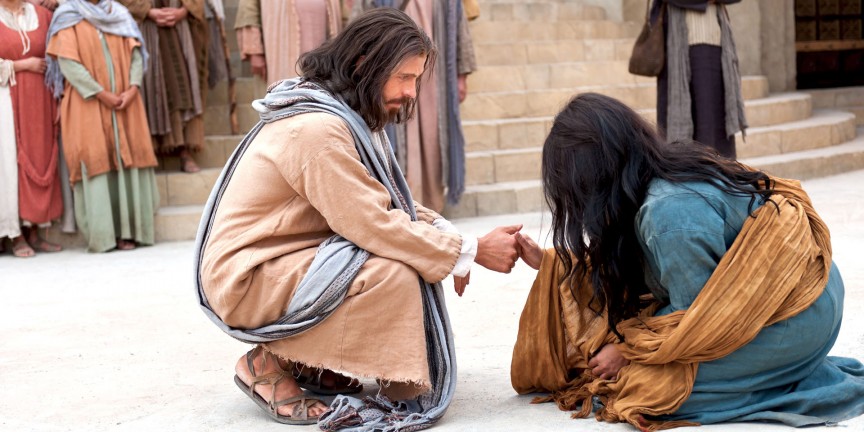Jesus stoops down to raise us up
Jesus has a better way of dealing with sin than condemnation and punishment.
Apr 01, 2022

Reflecting on our Sunday Readings with Fr Bernard Arputhasamy, SJ
5th Sunday of Lent (C)
Readings: Isaiah 43:16-21;
Philippians 3:8-14;
Gospel: John 8:1-11
The readings this Sunday have a common thread. Each one reveals that the most important intention or purpose of God for human beings is to set them free. God endeavours to draw them out of the various captivities, of being trapped in their destructive realities, towards what Paul called “the glorious freedom of the children of God” (Rom 8:21).
The prophet Isaiah, in the first reading (Isa 43: 16-21), compares the liberation and homecoming — God’s hospitality — that will take place with the past liberation from Egypt, leading to forming Israel as a nation. Both the Exodus and the return from Exile prefigure, in Christian perspective, the Paschal liberation that God will bring about through the passion, death and resurrection of Jesus. The people will be formed to rise again and sing God’s praises (Isa 43: 21).
St Paul, a former Pharisee with great zeal for the law, tells us in the Second Reading (Phil 3: 8-14) how “I have indeed been taken possession of” by Jesus Christ, captured by Him and set free. Using one of his favourite images — athletic competition — Paul describes his position in the race now, i.e. he is not back at the start, he has not yet arrived at the perfect finish but he is still running, putting the past behind him with his eyes set upon the finishing post and prize that lies ahead.
Does our Christian spirituality and life trap us or capture us to live in the guilt of the past, in trapped-regret of our own “Egypt”, in the shame of thinking that we are not worthy, not good enough of being “taken possession of by Christ Jesus”?
Do we see ourselves as God sees us and loves us? A God who calls us to be a pilgrim people, leaving the past behind and setting our sights on journeying towards God?
In the Gospel today (John 8:1-11), the main point of the scribes and Pharisees is not to get the woman punished but to set a trap for Jesus. Would Jesus defy the law of Moses or would He condemn the woman to death? Only the occupying Roman powers can condemn someone to the death penalty (Jn 18:31).
What did Jesus write on the ground? We do not know! Perhaps, He was only doodling, an action which shows no interest in the issue of the blood-thirsty crowd before Him. He has no interest in their deceitful traps. The writing, however, provides a moment for the opposition to melt away, to diffuse the tension present, to take away the focus of the accusers on the woman.
Jesus has been put in a tight spot, a trap. How does He get out of the trap? Jesus chooses not to confront the law directly. “He looked up and said, ‘If there is one of you who has not sinned, let him be the first to throw a stone at her.’ Then he bent down and wrote on the ground again” (Jn 8: 7b-8). Only the person who has never sinned could have a right to condemn another! Perhaps, the eldest start to leave first because of their longer life of accumulated sin.
Jesus has a better way of dealing with sin than condemnation and punishment. The narrow or rigidly punitive legal way is not the way for Him. To be sure, He does not deny or condone sin. It appears that the woman is in fact guilty; however, we might as well ask where her male accomplice is. It takes two to tango! Where is the justice of the law that the scribes and Pharisees claim to practise?
To note a subtle point in the story: Jesus never really looks at the woman while the scribes and Pharisees “persisted with their question” (v. 7). As long as the accusers continue their blood-thirsty demands, they are not able to look at the woman with equal dignity despite her sin! His bending down and writing may be a way to avoid playing into the hands of the accusers. After the accusers have left and when the woman is left alone, now Jesus is able to deal with her in a dignified manner, on equal footing as a human person. From this humble position, He is now able to talk to her as a woman. “Woman, where are they? Has no one condemned you? Neither do I condemn you”.
Jesus, who is the only one without sin (2 Cor 5:21), the only one with the credentials to judge her from “on high”, actually goes down humbly on the ground and looks up at her to restore her dignity and self-esteem. Jesus stoops down low in order to raise her up!
He is more concerned to rescue the woman from her terrible plight and set her free for a new life: “Go and sin no more”.
How often are we quick to condemn and punish others, thinking that we are practicing Catholics, religious people in the state-of-grace in order to feel “self-righteous”? Are we sometimes harsh and even quick to condemn and punish, rather than rescue and accompany people on the path to life?
Lent is about conversion of heart and deeper knowledge of God, about how we can look for ways to show the merciful heart of God as Jesus Christ has done.
Fr Bernard Arputhasamy SJ is the Assistant Priest of the Church of Jesus Caritas, Kepong.







Total Comments:0